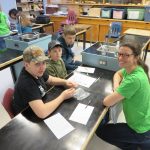 This past March I had the unique opportunity to lead a life sciences workshop for high school students in Chetwynd, BC. This community science outreach program (Geneskool) was funded by Genome BC. The workshops are designed to support the life sciences curriculum delivered in BC schools, by inviting UBC graduate student volunteers to present on select topics in genetics and forensic biology to high school science students. Through participation in an interactive crime scene investigation case, students were tasked with solving a murder by applying their critical reasoning skills through the examination of evidence collected through blood-typing, finger-print analysis, and DNA extraction activities. As a scientist, it was fun to help the students appreciate how the scientific method can be applied in the context of a crime scene investigation as well as integrate the different skills and knowledge they have learned through their classroom education.
This past March I had the unique opportunity to lead a life sciences workshop for high school students in Chetwynd, BC. This community science outreach program (Geneskool) was funded by Genome BC. The workshops are designed to support the life sciences curriculum delivered in BC schools, by inviting UBC graduate student volunteers to present on select topics in genetics and forensic biology to high school science students. Through participation in an interactive crime scene investigation case, students were tasked with solving a murder by applying their critical reasoning skills through the examination of evidence collected through blood-typing, finger-print analysis, and DNA extraction activities. As a scientist, it was fun to help the students appreciate how the scientific method can be applied in the context of a crime scene investigation as well as integrate the different skills and knowledge they have learned through their classroom education.
In addition to the delivery of workshop activities, we were encouraged to discuss our academic background and research interests to demonstrate examples of the different opportunities that exist for students aspiring to pursue further education and potentially careers in the life sciences. As both a physiotherapy and a PhD student, I was able to engage in discussion as both an ambassador for science and for physiotherapy practice. I used this as an opportunity to invite students to share their understanding of what physiotherapy is, which revealed how their perceptions of the role of our profession in health care are informed by their own personal experiences with physiotherapy services. For most students, these experiences were limited to treatment following orthopedic injuries.
When I introduced the topic of stroke rehabilitation in the context of my PhD research, I was impressed by the level of student interest and engagement. Despite not being as forthcoming when asked “What is a stroke?” many of the students raised their hands when asked if they knew anyone who had a stroke. This not only speaks to the far-reaching impact of this chronic disease, but also identified a knowledge gap among this youth demographic. The discussion that followed gave me the opportunity to share some basic information about the pathology of stroke and the role of physiotherapy in rehabilitation following neurological injury.
My teaching experience in Northern BC reminded me of how clinicians and clinical scientists have an important role to play in knowledge translation with respect to community education. By representing these two fields I was able share, inform, and hopefully inspire youth to consider pursuing careers in life science or health-related fields.
For more information about the Geneskool community outreach program, you can visit the following web site: https://www.genomebc.ca/education/what-is-geneskool/
Beverly Larssen is a student in the MPT/PhD combined program. She will graduate from the MPT program this Fall. She was also just awarded a CIHR doctoral fellowship to support her PhD work, a significant achievement given that this competition had only a 12% success rate. Ms. Larssen plans to study the impact of bimanual robotic training on recovery from stroke.
